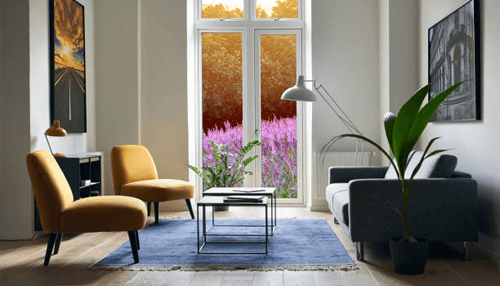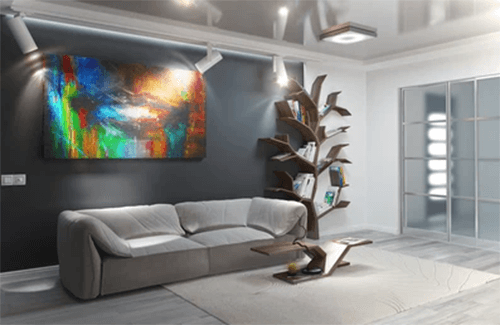Displaying art around the home requires the use of different techniques to those used in galleries, particularly as most homeowners are unlikely to have the heavy duty frames and extra-large portraits that many immediately think of when they consider what constitutes ‘art’. The key to displaying pieces well at home relies on adequate and ambient lighting to best highlight the prints, portraits, posters and embroidery on the walls.
Displaying the art well
The first part of displaying art correctly at home is to hang it in an appropriate way. A variety of hanging solutions can be purchased online to suit all art forms, including hooks, racks and picture rails by Picture Hanging Systems. Displaying art properly doesn’t always require holes to be drilled into walls – there are also options available for those renting who don’t want to make marks.
There are three main types of lighting and each can contribute to displaying art properly in the home. Read on for some top tips.
The three main types of lighting: Ambient lighting
Ambient, or general lighting, is the standard level of lighting for any room. Usually created using overhead light fixtures, it includes recessed pot lights, track lights, chandeliers and other ceiling lamps – but also standalone floor fixtures including table and floor lamps. These can use traditional light bulbs or LEDs for a warmer tone.
The level of ambient lighting may change throughout the day. For example, where overhead ceiling lights may be used in the daytime, lamps may be relied upon in the evening when a lower level of illumination is required.
Ambient lighting is required as a minimum for any home as without it, the walls will not be sufficiently lit to display art.
The three main types of lighting: accent lighting
Accent lighting is used in the home to create a focal point within a room by adding a new dimension in addition to the baseline ambient lighting, which may include highlighting a centred piece of art or several displayed across a gallery wall.
As a general rule, accent lighting should direct a minimum of three times as much light toward the desired focal point compared to the rest of the room. This draws your attention to the point without drawing attention just to the light. Accent lighting is usually accomplished with recessed or track lighting, specialist picture lights or sconces that are directed toward the art to be displayed.
When using accent lighting to highlight paintings, LED bulbs should be used. LEDs don’t emit UV light and are almost entirely free of heat so will not damage paintwork even when close to it for a prolonged period of time.
Musaartgallery is a space where art comes to life. We showcase a wide range of artwork from talented artists around the world, blending modern creativity with timeless beauty.
Explore unique pieces, discover emerging talent, and connect with the vibrant art community. We also offer workshops, events, and custom art services to make your experience unforgettable.
Visit us and be inspired by the magic of art!
The three main types of lighting: task lighting
Task lighting is the third, and least used, type of lighting within the home – but can still be used to help create a focus on a piece of art. Used literally to help individuals complete a task, it is normally achieved using lights and lamps specifically angled toward the task at hand.
Lamps used to focus on art hanging on the walls or displayed in standing frames or mounts should reduce glare and ideally be focused directly on the piece or just below it to up-light. Halogen bulbs are the most popular choice for task lighting as they generate a similar white light to that produced by standard daylight as well as using less energy than standard incandescent choices.
Art in the home can be a joy to view and when displayed and lit properly will impress all of those who see it, time after time.



